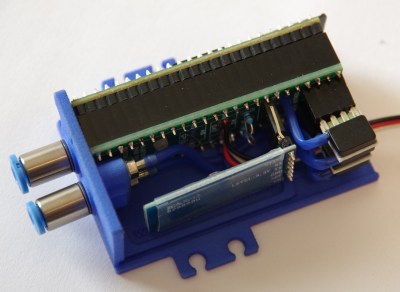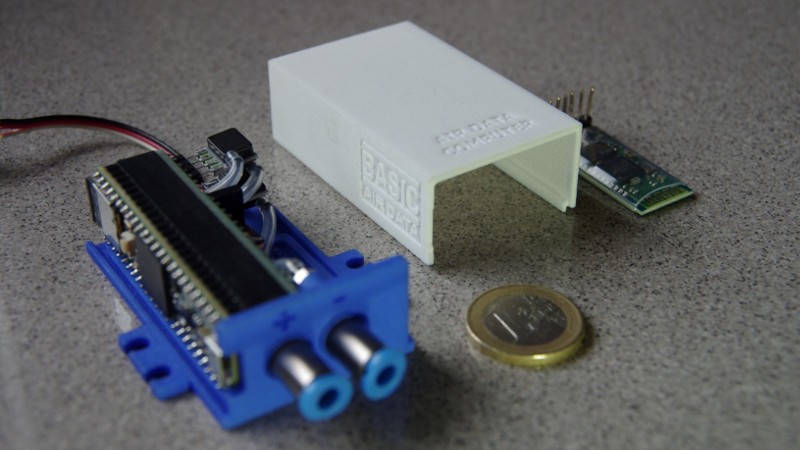We get a lot of awesome projects sent our way via the tip line. Well, mainly it seems like we get spam, but the emails that aren’t trying to sell us something are invariably awesome. Even so, it’s not often we get a tip that contains the magic phrase “determine Mach number” in its list of features. So to say we were interested in the Asgard Air Data Computer (ADC) is something of an understatement.
 Now we’ll admit right up front: we aren’t 100% sure who the target audience for the Asgard is, but it certainly looks impressive. Team member [Erik] wrote into tip line with information about this very impressive project, which is able to perform a number of measurements on incoming air, such as true speed, viscosity, and temperature. The team says it has applications ranging from HVAC to measuring the performance of bicycles. We don’t know who’s going so fast on their bike that they need to measure air speed, but of course the hacker community never ceases to amaze us.
Now we’ll admit right up front: we aren’t 100% sure who the target audience for the Asgard is, but it certainly looks impressive. Team member [Erik] wrote into tip line with information about this very impressive project, which is able to perform a number of measurements on incoming air, such as true speed, viscosity, and temperature. The team says it has applications ranging from HVAC to measuring the performance of bicycles. We don’t know who’s going so fast on their bike that they need to measure air speed, but of course the hacker community never ceases to amaze us.
Even if you don’t have a jet fighter that could benefit from a high performance ADC such as Asgard, you have to be impressed by the incredible work the team has done not only designing and building it, but documenting it. From the impeccably designed 3D printed case to the stacked PCB internals, every aspect of Asgard screams professional hardware.
Data collected from Asgard can be stored on the internal micro SD if the device is to be used in stand-alone mode, or you can connect to it over USB or Bluetooth thanks to the HC-05 module. The team has even put together some scripts to merge the Asgard’s generated air data with GPS position information.
We’re all for putting high quality sensors in the hand’s of the community and seeing what they can come up with. The spirit and build quality of this project reminds us of the impressive work [Radu Motisan] has been doing with his distributed air quality sensors.
















> We don’t know who’s going so fast on their bike that they need to measure air speed
The answer, of course, is Colin Furze:
https://www.youtube.com/watch?v=bKHz7wOjb9w
Safe JET bike- the most dangerous safe bike ever
Bob Maddox might be interested.
https://www.youtube.com/channel/UC8ui_J9ROP81qvp1my83KiA
Remote controlled jet aircraft operators might like this too.
Check out openvario.org for a much more feature complete flight computer (mainly for gliding). Runs the open source XCsoar and has four pressure sensors (with inputs for pitot (airspeed), static & total energy sources), as well as an accelerometer and auxiliary inputs (GPS).
Originally produced by Austrian students, it is completely open source with plans for download. Milled mine on my homemade CNC machine, got a good season flying out of it, and have hacked in an artificial horizon. Some people are successfully selling downstream versions.
Commercial instruments run into at least four figures.
I was expecting a computer that used pneumatic lines for the networking. Really slow really leaky amusing though.
Still was interesting to read.
There’s an Arduino based barograph design which uses a cheap absolute air pressure & temperature sensor to record barometric pressure over time and produce a graph. All parts were easily available from Adafruit (plug). I built one and have been running it for several months now. It’s pretty accurate (even without temperature compensation) compared to my local NWS pressure readings. I even caught the recent “bomb cyclone” that hit the East Coast of the US a couple of weeks ago. The pressure drop was pretty dramatic.
> We don’t know who’s going so fast on their bike that they need to measure air speed
I think I can infer you don’t ride a bike! If if you ride your bike at, say, 18 mph, on flat ground, more than 90% of the work you are doing is against air. Before I go for a bike ride, I always check the current wind conditions and sometimes change my planned route because of it. If you simply measure speed and incline to compute power, your results will be useless without also knowing wind speed. There are power meters which do this, but most skip all that and use strain gauges built into the cranks, pedals, or rear wheel hub instead.
A bicycle bicycle power meter/power estimator based on air speed: http://www.powerpodsports.com/
I haven’t got one, but I heard it kinda works.
It could be useful for logging speed and altitude on model rockets and that data could be useful for deciding when to deploy the parachutes.
Maybe go one farther and have the ADC control parachute deployment.
I need to have a Mach unit speedometer in my car. So when I get pulled over by a cop for speeding, and they ask how fast I was going, I can respond, “Mach 0.15 sir.”
#nerdgoals
That’s only 115mph (185km/h), but I can’t afford a new Tesla either so I get it.
Just to know. The guys from the project are attempting to produce a DIY batch https://www.basicairdata.eu/projects/airdatacomputer/asgard-adc/asgard-air-data-computer-unit-diy-batch/